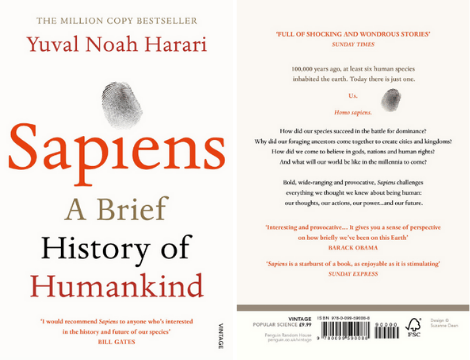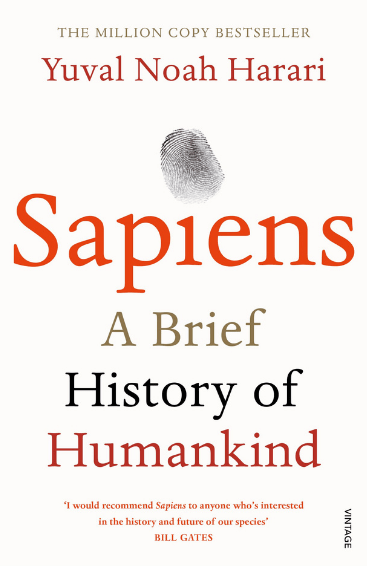Yuval Noah Harari focuses nearly all of his book on ourselves as a species: despite our self-ignorance, we nonetheless know considerably further about ourselves than other human species, even some that have previously failed since we first roamed the Earth. The reality is that the history of sapiens, as Harari refers to us, is a minor fraction of the overall past of humanity.
Sapiens goes on to recreate the origin of our civilization from a whole new viewpoint, starting with this fascinating concept. It explains why money is the most multi-ethnic system of mutual trust ever invented. Download Sapiens :A brief history of humankind pdf .
Dr. Yuval Noah Harari’s book Sapiens covers the whole history of humanity, from the earliest people through the dramatic – and often fatal – advances of the Cognitive, Agricultural, and Scientific Revolutions. Using various concepts of biology , anthropology and economics, Harari illustrates how all these historical events have influenced the evolution of humans and other living creatures .He also questions “Have we gotten happy as time has passed? Can we ever be free of our forefathers’ legacy in our actions? And what can we do, if anything, to affect the destiny of future centuries?”
| Name | Sapiens :A brief history of humankind |
| Author | Yuval Noah Harari |
| Publisher | Penguin Random House |
| Pages | 512 |
| Language | English |
Also Download : The Unhoneymooners by Christina Lauren | And Then There Were None By Agatha Christie
Sapiens: A Brief History of Humankind by Yual Noah Harari Pdf Download
The book begins with an engrossing overview of the evolution and growth of our species, Homo sapiens. However, the second chapter talks about the Agricultural Revolution, Harari shifts gears and abandons all pretense of being a serious book. His goal is to show that the invention of agriculture was one of humanity’s worst blunders. Yes, it enabled civilizations to flourish, but on a personal level, we were far better off as hunter-gatherers, he says. People worked harder as farmers, and in exchange, they had worse nutrition than foragers. Agricultural cultures also developed social systems in which the bulk of people worked as peasants and was dominated by a small group of elites.
He appears to be totally convinced the world would have been a better place if humans had simply remained in the hunter-gatherer period. It appears that all the millions of humans who have lived since then are misguided and don’t comprehend and that only he does.Download Sapiens:A brief history of humankind pdf .
Harari feels that our distinct cognitive capacities were the deciding factor. A million years ago, Homo sapiens was simply one of many diverse human species vying for dominance. There were different species of people, just as there are different species of bears or pigs now. While our forefathers mostly resided in East Africa, our cousins, Homo neanderthalensis, or Neanderthals, lived in Europe. Other species, Homo erectus, lived in Asia, while Homo soloensis lived on the Indonesian island of Java. Each species adapts to its specific surroundings. Others were dwarf-like plant gatherers, while others were large, ferocious hunters. There is proof of hybridization among the species, regardless matter how distinct they were.

According to Harari, Homo sapiens had a “cognitive revolution” some 70,000 years ago, which gave them an advantage over their competitors and allowed them to expand from East Africa throughout the globe. Although other species have enormous brains, Homo sapiens is unique in that humans are the only mammals capable of large-scale collaboration. We understand how to arrange ourselves as nations, corporations, and faiths, giving us the ability to do difficult tasks. Harari’s concept of a “cognitive revolution” inspires us of David Christian’s concept of “collective learning,” in which the ability to share, preserve, and expand upon the information actually defines us as humans and allows us to survive, as described in big history.Download Sapiens:A brief history of humankind pdf .
Sapiens: A Brief History of Humankind Full Book Pdf Download
Sapiens is a daring, wide-ranging, and controversial book that questions all we thought we understood about becoming human: our ideas, actions, power, and future.
Most people will be able to understand and comprehend complicated subjects if they are explained in a way that they can understand, Sapiens tries to present a digestible and short historical account of human evolution in less than 500 pages.Download Sapiens:A brief history of humankind pdf .
Sapiens gets off to a solid start with an intriguing depiction of prehistoric homo history and evolution, culminating in the emergence and ultimate dominance of our own species. The rest of the book, on the other hand, is mostly made up of the author’s personal observations and reflections on the human experience and character.
Harari’s perspective is distinct in that he emphasizes the power of tales and myths to unite people. Homo sapiens has a unique ability to bring millions of strangers together around shared mythology. Ideas like liberty, human rights, deities, laws, and economics exist only in our heads, yet they have the power to unite us and drive us to work together on difficult tasks.
The book covers all questions such as “why the capitalist system is the most successful religion ever devised; why modern agriculture’s treatment of animals is likely the worst crime in history; and why, despite being far stronger than our ancient ancestors, we aren’t much happier.”
Thus, Sapiens gained cult status among a wide range of audiences by combining profound truths with a strikingly vivid language, enthralling teens as well as college professors, environmental activists as well as government leaders.

